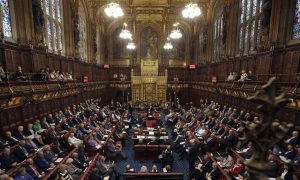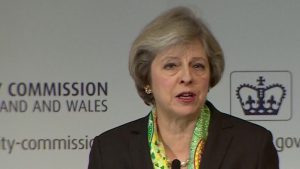Latest News
CQC announces new partnerships with charities and patient groups
They’ll be working with Carers UK, Disability Rights UK, Mind, The National Autistic Society, Patients Association, and the Relatives & Residents Association, as ‘Tell us about your care’ partners.
While anyone can contact the CQC directly if they would like to share their concerns and experiences of a health or care service in England (anonymously, if they wish to do so), their Tell us about your care partnerships enable these organisations to pass on this information to CQC too, so that they can continue to be a responsive regulator that listens to and acts on people’s experiences of care.
The partnerships are also an opportunity to help identify best practice examples of where high-quality and compassionate care is being provided so that others can learn from them.
Chris Day, Director of Engagement at the Care Quality Commission, said:
“People’s experiences of care are absolutely vital to CQC’s work. They help us to identify where care may be falling below the standards we all have a right to expect, and where outstanding care is being provided.
“We share common cause with organisations that work with and represent people who use services in wanting to make sure that our health and social care services provide safe, effective, compassionate and high-quality care, which is why it’s fantastic to be working with Carers UK, Disability Rights UK, Mind, The National Autistic Society, Patients Association, and the Relatives & Residents Association in this way. They will help us to reach even more people who may have information that can allow us to take action against poor care, encourage improvement, and to celebrate great services.â€

Children and social work bill could end the law as we know it
The Department for Education’s (DfE’s) “power to test different ways of working†is set out in the children and social work bill and intended to allow local authorities to apply to the education secretary for permission to opt out of child protection laws. Superficially, deregulation is a very attractive proposition – red tape and bureaucracy undoubtedly are sources of frustration for many professionals and service users. The Munro review of child protection illuminated this problem.
But the argument for and detail of these clauses in the bill have raised significant concern. What is described as a “new way of working†is fundamentally a new way of working the law itself. There is therefore a key question: do these clauses end the law as we know it and replace it with a form of bureaucratic tyranny? Instead of law being made by parliament, will services be determined locally and by a bureaucratic process?
It is the sovereign right of parliament alone to make and amend the law. The law of the land applies to everybody – to every area, service and individual. And the courts alone have the duty and responsibility to determine the administration of the law. A clause that transfers these powers to individual local authorities and the secretary of state is a fundamental challenge and change to the constitution.
The examples cited by DfE to illustrate how this new power might be used are of great concern. These include introducing “flexibility†in the role of independent reviewing officers, who may no longer need to chair care plan reviews for children in “settled placementsâ€.
It is also suggested that adoption and fostering panels will be made optional or subject only to electronic forms of communication. This is a major turning away from their long established and critical role in big decisions that affect children throughout their lives. A “lower level of assessment†for family and friends foster carers is also proposed.
The DfE demonstrates a very poor level of understanding of the operation of these specific examples. For example, it argued – erroneously – that the current requirements for being approved as a foster carer result in family and friends of carers being excluded because every child requires a separate bedroom, a difficult issue given the housing situation of some of these families.
The fact is that the framework for the assessment and support of family and friends carers is facing a significant challenge. At least three children in such placements have died at the hands of family members in recent years, and serious case reviews have taken place into at least two of these. Learning from the terrible suffering of these children should take place nationally and be informed, thorough and responsible. The identified “solutions†and the resources must be embedded in law and apply to every child, every carer and every service. Every one of the DfE’s “innovation†examples can be explored in a similar way.
Currently the law applies to every child, family and service. While there is local provision at one level, the law provides a universal framework. There may be an unacceptable postcode lottery of services now but these clauses would legitimise and entrench this. Above all, they would lead to the undermining of the rights and position of children, their parents and other service users and providers. When the House of Lords explored the clauses in detail, peers voted to strike them out.
The bill was introduced for scrutiny and debate into the Commons before Christmas. The children’s minister, Edward Timpson, tabled amendments to reinstate the clauses. These protect six sections of children’s services legislation from the power to test deregulation and add some safeguards.
Yet core questions remain. Are we testing the potential for local “tyranny†as opposed to upholding the law of the land? Are we encouraging a hotchpotch of local provision and fragile protection rather than high quality services available as a right to every child and young person? Is this the avoidance by government of its responsibility to prioritise and resource a national children’s social care service? Who will benefit in the end? The Commons has a significant opportunity and responsibility to reinstate its sovereign power to make and change the law in the best interests of its citizens. It is to be hoped MPs use their constitutional power to delete these clauses from the bill.

Online fire awareness course for carers launches
The course will help you identify fire hazards and keep yourself and the person you care for safe. It takes around 30 – 60 minutes to complete the course:Â Learn more.

Mental health reforms to focus on young people, says PM
Additional training for teachers, an extra £15m for community care, and improved support in the workplace were among measures announced by the PM.
Mental health experts said more funding was needed to improve services.
Mrs Mayâ€s speech comes as she outlined her plans to use the state to create a “shared societyâ€.
The government says, at any time, one in four people has a mental disorder, with an annual cost of £105bn.
The prime minister said mental health had been “dangerously disregarded†as secondary to physical health and changing that would go “right to the heart of our humanityâ€.
Health Secretary Jeremy Hunt told the BBC care for children and young people was a “black spot†that needed urgent attention as the pressures of social media, cyber bullying and a big increase in self-harming was a “massive worry for parentsâ€.
Mental health charity Mind said it was “important to see the prime minister talking about mental health†but the proof would be in the difference it made to patients†day-to-day experiences while Sane said the plans needed to “be matched by substantially increased funds to mental health trustsâ€.
Dr Sangeeta Mahajan, whose 20-year-old son Sargaar killed himself after being diagnosed with bipolar disorder, said better access to services was essential.
“They donâ€t discharge patients with adequate information,†she said. “The doors were closed to us.
“We were told you either go to A&E or your GP and that is the only way you can come back to us.
“We had no direct access back to the specialist services. That is wrong.â€
Bed shortages have meant some patients have had to travel hundreds of miles for treatment.
Fiona Hollings, 19, was treated in a specialist eating disorder unit for her anorexia in Glasgow – nearly 400 miles away from her family home in High Wycombe, Buckinghamshire.
Raising the profile of mental health
Mental health campaigners certainly recognise the significance of the latest initiative headed by the prime minister.
Theresa Mayâ€s focus on mental illness in her first major speech on health will in itself raise the profile of the issue and reaffirm the drive to achieve true “parity of esteem†with physical health.
Promoting mental health first aid training in schools in England illustrates the prime ministerâ€s desire to see this as more than an NHS-only issue.
But there is no new Treasury money for the plans. Funding for care is still challenging. NHS Providers, representing mental health and other trusts, predicts the share of local NHS budgets devoted to mental health will fall next year.
Ministers will argue money isnâ€t everything but it remains an unresolved part of the mental health agenda.
Professor Sir Simon Wessely, president of the Royal College of Psychiatrists, welcomed Mrs Mayâ€s “new and bold visionâ€, but added: “We have a long way to go before mental health services are on an equal footing with those for physical disorders.â€
Businesses also welcomed the workplace initiatives.
Simon Walker, director general at the Institute of Directors, said employers had “a real role to play†in ensuring the mental health of their workforce.
But while education leaders backed the ideas that focused on young people, they also had concerns.
Malcolm Trobe of the Association of School and College Leaders, said the major problem schools faced was a lack of access to local specialist NHS care and said government plans had to be “backed up with the fundingâ€.
Russell Hobby, of school leaders†union NAHT, agreed: “Rising demand, growing complexity and tight budgets are getting in the way of helping the children who need it most.â€
Liberal Democrat Norman Lamb, a former health minister, said Mrs May was announcing policies already agreed under the coalition government and called it “a puny response†to “cover up for this governmentâ€s failure†on delivering, while Barbara Keeley, Labourâ€s shadow minister for mental health, questioned why funding was not being ring fenced.
Mr Hunt said the government had endured a “slightly patchy start†with funding, but that with about £1bn more being spent on mental health than two years ago things were “going in the right directionâ€.
In her speech the prime minister also described her wish to create a “shared societyâ€, with the state taking a greater role in ending “unfairnessâ€.
The emphasis on a “shared society†marks a contrast with her predecessor David Cameronâ€s “Big Society†agenda, which relied on voluntary organisations rather than state intervention.

Smart meters: a guide
The new meters
Smart meters are the next generation of gas and electricity meters and offer a range of intelligent functions.
For example, they can tell you how much energy you are using through a display in your home. They can also communicate directly with your energy supplier meaning that no one will need to come and read your meter in future.
Most of the smart meters that are being installed today use mobile phone-type signals to send meter readings to your supplier, and other wireless technologies to send information to the in-home display.
Benefits of smart meters
Smart meters bring a wide range of benefits. For example:
- smart meters give you near real time information on energy use – expressed in pounds and pence
- you will be able to better manage your energy use, save money and reduce emissions
- smart meters will bring an end to estimated billing – you will only be billed for the energy you actually use, helping you budget better
- easier switching – smoother and faster to switch suppliers to get the best deals
You will not be charged separately for a smart meter or for the in-home display. Under current arrangements you pay for the cost of your meter and its maintenance through your energy bills, and this will be the same for smart meters.
Benefits for Prepayment customers
Smart meters can work in prepayment or credit mode. Prepayment customers will see some particular benefits from having a smart meter. For example:
- your energy supplier may be able to offer you new and more flexible ways of topping up your meter that don’t require you to visit a shop
- you’ll be able to see your balance on your easy-to-access in home display, so you don’t unknowingly run out of credit
- your smart meter can be set to top up automatically, so that if you do run out of credit at night or when the shops are shut you won’t be left without power
Further information on the benefits of smart meters, what they are and how they work, is available on the Smart Energy GB website
Supplier led roll-out
The government is requiring energy companies to install smart meters for their customers, and has set out rules to ensure that they do this in a way that is in the interests of consumers, including rules around:
- data access and privacy
- security
- technical standards for the smart metering equipment
- meeting the needs of vulnerable consumers
Smart meters will be rolled out as standard across the country by the end of 2020. But there is no legal obligation on individuals to have one.
Consumer protections
The government has ensured that appropriate consumer protection provisions have been put in place:
- there will be no sales during the installation visit
- installers must provide energy efficiency advice as part of the visit. They will need the consumer’s permission in advance of the visit if they are to talk to them about their own products
These provisions are outlined in the Smart Meter Installation Code of Practice.
Consumer privacy
You will have a choice about how your energy consumption data is used, apart from where it is required for billing and other regulated purposes.
You will be able to see your real-time energy consumption data on your in-home display. You will also be able to download more detailed historic data from your home network, should you wish to.
Your energy company, and the energy networks, can access appropriate data to enable them to send you accurate bills and carry out other essential tasks.
Suppliers will have to get your consent to access half-hourly data, or to use data for marketing purposes. They can access daily data unless you object.
You will also be able to share data with third parties (such as switching sites) if you want them to give you advice on the best tariff for you.
The Data guide for Smart Meters published by Energy UK outlines the key information customers need to know about their rights and choices when they get a smart meter installed.
Switching suppliers
Smart meters will ultimately make switching suppliers easier and quicker. It is important that smart metering devices work together (even if from different providers) and also that consumers can still use the meter on change of supplier. However, meters installed during the Foundation stage may lose some smart functionality depending on which energy supplier you switch to. This will be resolved for the vast majority of meters installed during the main rollout as more energy suppliers begin installing smart meters.
In most cases, if you switch during the Foundation stage the meter can still be used in ‘traditional’ mode if the new energy supplier cannot support the smart functionality at the stage of switching suppliers. The In Home Display (IHD) issued alongside the smart meter should still continue to operate and show you near real time information about your energy consumption.
Ofgem has introduced rules designed to help domestic consumers understand if the smart services they are receiving will be maintained when they switch supplier. The rules include a requirement that a supplier installing a smart meter must inform the customer that they may lose meter functionality on change of supplier.
Safety
Smart meters are covered by UK and EU product safety legislation, which requires manufacturers to ensure that any product placed on the market is safe. Public Health England (formerly The Health Protection Agency) provides advice and information on the health implications of smart meters, as it does for a range of technologies commonly found in homes and businesses across the UK.
Public Health England has advised that the evidence suggests that exposures to the radio waves produced by smart meters do not pose a risk to health. Further information about smart meters and health.
Timeframes for installation
Most households will have smart meters installed by their energy company between 2016 and 2020, although some energy companies are starting to install smart meters now. If you are interested in getting a smart meter now, shop around and contact different energy companies to see what their plans are. A selection of links to some suppliers’ smart meter pages can be found on the Smart Energy GB website.
Further information?
Contact your energy supplier or see:

Money earmarked for children’s mental health being diverted to fund other services, research finds
In 2015, the government pledged an extra £1.4 billion over five years to “transform†child and adolescent mental health services (CAMHS) but research undertaken by YoungMinds into the responses of 199 clinical commissioning groups (CCGs) from Freedom of Information requests has found that this money is often not reaching its intended destination.
In the first year of extra funding (2015-16), only 36% of CCGs that responded increased their CAMHS spend to reflect their additional government funds. The remaining 64% used some or all of the extra money to backfill cuts or to spend on other priorities.
While in the second year of extra funding (2016-17), 50% of CCGs that responded increased their CAMHS spend to reflect their additional government funds, the other half still used some or all of the extra money for other priorities.
Fewer than half of the CCGs that responded were able to provide full information about their CAMHS budgets.
Sarah Brennan, chief executive of YoungMinds, said: “After years of cuts, the government’s recent investment in children’s mental health services was hugely welcome, and we should now be witnessing significant improvements across the country. But the reality is that the situation varies enormously from one area to the next. While some CCGs have made big increases in their spending, it’s deeply concerning that so many others are using some of the new money to backfill cuts or to spend on other priorities.
“It is also alarming that half of CCGs can’t provide full information about their CAMHS budgets. If they aren’t properly tracking how much money they are spending, it is impossible to say whether services are improving.
“[Health Secretary] Jeremy Hunt has described CAMHS as the single weakest area of NHS provision, so it is vital that all the new money is spent where it was intended – on creating better services with a greater focus on early intervention.â€
Sean Duggan, chief executive of the Mental Health Network, called for the pace of funding to quicken if the government’s promise of transforming CAMHS is to be fulfilled: “Children and young people’s mental healthcare is quite simply underfunded at a time when this age group is suffering from rising mental health problems,†he said.
“NHS commissioners’ contract negotiations for the next two years [closed] on 23 December [2016]. There is a serious and pressing need for these contracts to get things back on track by moving promised funding from the commissioners to frontline services. This is currently our biggest opportunity to improve mental health services and we cannot afford to waste it.
“The best evidence shows that, pound-for-pound, mental health services make a cost-effective contribution to public health. Their expansion is important if the NHS is to remain sustainable and if patients are to receive a well-rounded experience of care.â€

Sense Survey – Achieving Long Term Independence
“We know that family members often become the predominant carers for their loved ones. As a consequence, those being cared for may not always have the independence they would like and those providing care ask them-selves ‘what will happen to my loved one when I can no longer support them?’ This can be a major concern and cause of anxiety for many families. They want to find out how “widespread this problem is for people with complex needs and their families. Sense also want to understand how people end up in this situation and what the potential solutions could be.”
Do you or a friend/family member use care and support services? @sensetweets would like to hear from you https://www.surveymonkey.co.uk/r/8JC86D2

Half of carers ‘at risk’ by being trusted with someone’s PIN
Research has revealed for the first time the extent of the dilemma facing carers and family members, as well as the huge potential for financial harm caused by their lack of rights provided by the current banking system.
Under proposals being launched today by the Money and Mental Health Policy Institute, a charity set up by Martin Lewis, carers would be granted the right to use other people’s cards to buy them essentials, including supermarket shopping, prescriptions and household bills.
At present the UK banking system does do not allow casual use of debit cards by carers unless they have full power of attorney, a special right which can be expensive to obtain and often requires the involvement of a solicitor.
This is despite millions of elderly and disabled people in the UK relying on carers to handle their basic financial affairs as they feel unable to do it themselves.
Polly McKenzie, director of the Money and Mental Health Policy Institute, described the current system as an “absolute disaster which puts people who simply want to help the people they love in legal and emotional jeopardy.”
She added that limited carers’ rights would minimize risk of fraud against the elderly as their spending would be easily capped, tracked, and separated from their own spending.
Her proposals were welcomed by experts, including Baroness Altmann, the former pensions minister and a campaigner for improving elderly care.
She told the Daily Telegraph: “This country has not yet woken up to the fact that more people will need care or be carers in the very near future but this has got to change.
“I am in support of anything that makes the system easier for carers, as the process for getting power of attorney is far too difficult and complicated right now. Carers are finding that even when they have power of attorney bank staff don’t know the rules, which is of course very frustrating.”
There are almost seven million unpaid carers in the UK and nearly a million (880,000) people care for someone with a mental health problem.
To meet this large and growing demand, this newspaper understands a number of banks including Barclays and Coventry building society have considered developing special “carers cards” to give carers limited access to someone’s accounts.
The proposals were also met with warnings that the British justice system also needs reforming as it is failing elderly victims of financial abuse.
According to charity Action on Elder Abuse hundreds of thousands of criminals are escaping punishment each year for preying on pensioners, with fewer than 1 per cent of cases ever reaching the courtroom. Only 0.7 per cent of all estimated crimes against people aged over 65 result in criminal charges, it said.
Chief executive, Gary FitzGerald, said: “It’s about striking a balance between letting carers help people run their lives and preventing fraud in cases where the carer puts their own interests above the person they are looking after.”
Under current rules giving a carer a PIN number or other confidential bank details breaks the terms and conditions of the account and means the account holder is potentially liable for any fraud carried out by a carer.
For example if someone gives their card to a carer to withdraw £50, also taking £50 for themselves, they would be liable for both transactions and would have little recourse as a victim of fraud or financial abuse.
In addition carers using cards could face accusations of fraud, particularly if the person they are caring for is too ill to properly understand what they are doing, or if family members dispute the way they are managing the person’s money outside of a formal legal arrangement.
The British Banking Association declined to comment.

Seven-day NHS plan puts weekday surgeries at risk, warns top GP
Britain’s top GP has said surgeries will have to stop seeing patients during the week unless ministers abandon their drive to guarantee access to family doctors at weekends.
Dr Helen Stokes-Lampard condemned the policy, a key Conservative pledge, as unrealistic and said it was ignoring the lack of demand among patients to see GPs at weekends and a serious shortage of family doctors.
The government has promised to ensure that people in every part of England will be able to see a GP from 8am to 8pm every day of the week by 2020 as a key element of its push to create a “truly seven-day NHS†by the end of the current parliament.
“It’s unrealistic in the current climate. We haven’t got the people, we haven’t got the resources. If you give people access on a Sunday afternoon they’re not going to have access on a Tuesday morning. They can’t have it allâ€, the chair of the Royal College of GPs said in an interview.
Calling for surgeries weekend opening to be restricted to Saturday mornings, Stokes-Lampard said: “We should be responding to what is needed in an area, and balance that realistically by what can be provided safely. Because quite frankly if you open on a Sunday afternoon but you’re closed on a Tuesday morning, who’s going to benefit?.
There is so little demand from patients to see a GP on Sundays that plans to compel at least one surgery in each area to open on that day by 2020 should be dropped, she said. Nor do many people want to attend a surgery on a Saturday afternoon, she added.
David Cameron pledged access to GPs from 8am to 8pm seven days a week at the Conservative party conference in 2014, and established a £50m “challenge fund†to deliver it. Some surgeries that have begun opening at weekends, however, have scrapped their experiment because of the small numbers of patients seeking appointments on Saturdays and Sundays.
A relentless rise in the need for care is prompting more GPs to retire early or move abroad, leaving the profession facing a growing workforce crisis and patients facing long waits for appointments, Stokes-Lampard said. As a result “we’re layered too thin at the moment, we’re spread too thin. We can’t sustain a good five-day service at the moment, a seven-day service is unrealistic. If we can’t provide eight to six Monday to Friday because we’re stretched to breaking point, we’re certainly not going to be able to provide seven days a week.â€
She said general practice was “closer to the edge than it has ever been in living memoryâ€, and cast serious doubt on ministers being able to fulfil another key NHS pledge – to increase the number of GPs in England by 5,000 by 2020 compared with 2015. It will be very hard to deliver that number without many GPs coming from overseas or former doctors being persuaded back into work, she said.
The Liberal Democrat MP Norman Lamb, who was a coalition health minister until May 2015, denounced the pledge of access to GPs all day and every day as a “superficially attractive gimmickâ€.
“This target is driven by seductive headlines, not sound policy. It will distort priorities and resources away from action which could make a real difference to people’s lives, such as ensuring that people have both their physical and mental health needs effectively met in primary care,†he said.
“No one believes that there will be sufficient resources to deliver this plan. The risk is that it will leave dangerous gaps in provision during the week.
“Pursuing superficially attractive gimmicks like this amounts to a smokescreen for the dire threat the NHS and care system now faces as it is starved of the resources it needs to provide effective, prompt and safe care.â€
The shadow health secretary, Jonathan Ashworth, said: “These serious doubts about a flagship government pledge will raise widespread concerns. It’s yet another warning about the scale of the underfunding and understaffing now impacting our NHS.
“In her six months as prime minister Theresa May has shown no regard for the state of the NHS, so it’s no surprise it now looks like her own manifesto commitments will be broken.
“But in 2017 the government simply must not carry on ignoring the warnings. Instead they need to come forward with a genuine plan to give the NHS and social care the resources they need to deliver the very best care every patient deserves.â€
The Department of Health insisted the government would achieve its ambition of seven-day opening, and that the policy was popular. “This is a common sense reform with wide public support, and one we will deliverâ€, a spokeswoman said.
“People don’t just get ill Monday to Friday, nine to five, and 18 million patients now have weekend and extended access to a GP, which has already shown evidence of relieving pressure on other parts of the NHS.
“To deliver our pledge, we are putting an extra £2.4bn into GP services, which will help expand the workforce.â€

Universal basic income trials being considered in Scotland
Scotland looks set to be the first part of the UK to pilot a basic income for every citizen, as councils in Fife and Glasgow investigate trial schemes in 2017.
The councillor Matt Kerr has been championing the idea through the ornate halls of Glasgow City Chambers, and is frank about the challenges it poses.
“Like a lot of people, I was interested in the idea but never completely convinced,†he said. But working as Labour’s anti-poverty lead on the council, Kerr says that he “kept coming back to the basic incomeâ€.
Kerr sees the basic income as a way of simplifying the UK’s byzantine welfare system. “But it is also about solidarity: it says that everyone is valued and the government will support you. It changes the relationship between the individual and the state.â€
The concept of a universal basic income revolves around the idea of offering every individual, regardless of existing welfare benefits or earned income, a non-conditional flat-rate payment, with any income earned above that taxed progressively. The intention is to provide a basic economic platform on which people can build their lives, whether they choose to earn, learn, care or set up a business.
The shadow chancellor, John McDonnell, has suggested that it is likely to appear in his party’s next manifesto, while there has been a groundswell of interest among anti-poverty groups who see it as a means of changing not only the relationship between people and the state, but between workers and increasingly insecure employment in the gig economy.
Kerr accepts that, while he is hopeful of cross-party support in Glasgow, there are “months of work aheadâ€, including first arranging a feasibility study in order to present a strong enough evidence base for a pilot. “But if there is ever a case to be made then you need to test it in a place like Glasgow, with the sheer numbers and levels of health inequality. If you can make it work here then it can work anywhere.â€
The idea has its roots in 16th-century humanist philosophy, when it was developed by the likes of Thomas More, but in its modern incarnation it has lately enjoyed successful pilots in India and Africa.
Despite its utopian roots, champions believe that this is an idea whose time has come, particularly in Scotland where the governing SNP voted in support of a basic income at their spring conference (although the proposal has yet to make it into their manifesto).
At the heart of any experiment with basic income is money: how much should people get and where will it come from? Kerr says his instinct is to base the amount on similar calculations to those made for the living wage.
“It’s about having more than just enough to pay the bills. But part of the idea of doing a pilot is to make mistakes and also find out what is acceptable to the public. There will be a lot of resistance to this. We shouldn’t kid ourselves. Part of the problem is we’re working against a whole discourse of deserving and undeserving poor.â€
As for where the money comes from, “the funding question is always the big one, and really will depend upon the approach a pilot takes,†says Jamie Cooke, head of RSA Scotland, which has been spearheading research on the subject across the UK.
Drawing on the experience of similar projects ongoing in Finland, Utrecht in the Netherland and Ontario in Canada, Cooke suggests: “It could be funding from particular trusts, it could be individual philanthropic funding, as we have seen in the States, or it could be a redirection of the existing welfare spend.†Obviously the latter is much harder to do in a pilot, although that will be happening in Finland next year where the experiment is being taken forward by the national government.
As the Scottish government consults on what it has described as “the biggest transfer of powers since devolution began†– the devolution of around £2.7bn, or 15% of the total Scottish benefits bill, affecting 1.4 million people – both Kerr and Cooke believe that this is an ideal moment to consider the basic income seriously. “It’s a time to be testing out new – or rather old – ideas for a welfare system that genuinely supports independence,†says Kerr.
Cooke likewise believes that cross-party support is key, pointing to the fact that the leader of the Conservative group on Fife council has joined forces with the Fairer Fife Commission, the council’s independent poverty advisory group which initially recommended the trial, with the aim of designing a pilot within the next six months.
Scotland was recently added to the list of “places to watch†for basic income activity by the Basic Income Earth Network, founded by the radical economist Guy Standing, whose hugely influential book The Precariat identified an emerging social class suffering the worst of job insecurity and most likely to be attracted to rightwing populism.
“The thing about Scotland is that they really understand the precariat,†says Standing, who recently visited the country to meet civil servants, local authorities and campaigners to discuss a basic income. “The sense of insecurity, the stagnating living standards, all of those things are clear in Scotland and the fact that so many within the SNP are supportive means there’s a real opportunity to do a pilot in Scotland.â€
The momentum is there, he says, and once it is framed around a desire for greater social justice “then you get away from the stale debate about whether if you give people the basic income then they will be lazyâ€.
“People relate to the idea that everyone should have a social dividend. Everywhere I go, it’s the communities that feel left behind by globalisation that are most interested [in the idea of a basic income]. We have seen a sea-change in attitudes.
“This sense of alarm about populist rightwing politics has brought more people to thinking we need to do something to provide better security for people. We are risking our economic and political stability if we don’t do something about it.â€
